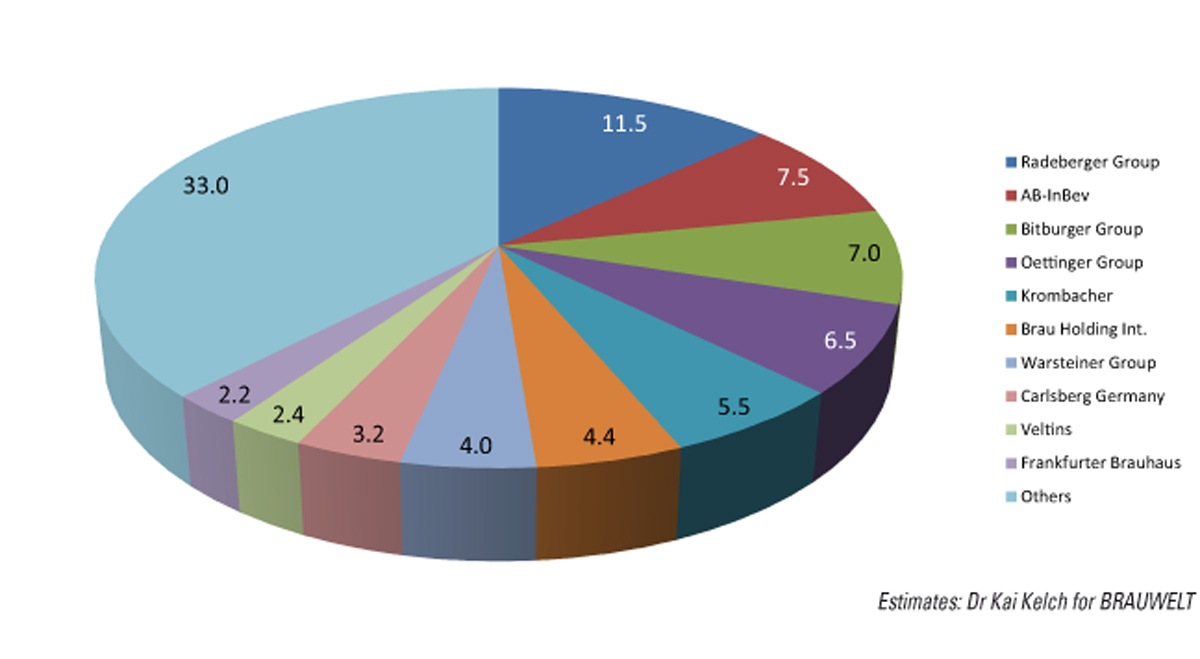After its plans to move the Dublin brewery to a greenfield site had fallen through following the collapse of real estate prices, Diageo, the parent of Guinness had to think anew. On 5 July 2011 Irish media reported that Diageo is in talks with Dublin City Council with a view to redeveloping part of its historic St James’s Gate brewery site.
Contrary to popular perception that the German beer market is dominated by domestic brands, imported beers have gradually made their presence felt. Beer imports have more than doubled over the past eight years from 3.3 million hl in 2008 to 6.9 million hl in 2010. That’s 8 percent of total beer consumption.
... next the ban on alcohol advertising? Even without a government, Belgium seems to get things done. On 1 July 2011 a ban on smoking in cafés was introduced following a ruling by Belgium’s Constitutional Court.
Carlsberg issued neither an affirmation nor a denial. Since Carlsberg had never officially put its German unit on the block, the Danish did not have to publish a statement that the much talked about sale of Holsten to Germany’s number one brewing group had been called off.
So they thought the Court would overturn a finding by the European Commission? Fat chance. On 16 June 2011 Heineken announced that the General Court of the European Union in Luxembourg has largely upheld the finding of the European Commission dated 18 April 2007, which said that Heineken and Bavaria had violated EU competition rules during the period 1996 - 1999 by setting up an illegal beer cartel in the Netherlands.
We have no idea what it’s like to spray something resembling shaving foam into your mouth but soft drink company Britvic thinks its latest offering, Turbo Tango, has great potential. Turbo Tango, launched in the UK at the end of June 2011, is a variant of the fizzy fruit drink, which is dispensed through an aerosol container using "nitro-fuelled" technology.
After a headline-grabbing strike and 18 months of hard-bargaining, the Belgian unions scored a victory. Instead of the 300 jobs, which had been identified for the axe in early 2010, only 167 are to go.
Heineken is front row and centre of a PR disaster. Thousands of pensioners from the former Scottish & Newcastle (S&N) brewery, represented by the S&N Pensioners Group think that the company’s new owner, Heineken, has not honoured pension promises. On 6 June 2011 the S&N Pensions Group (SNPG) made big headlines. Following Heineken’s announcement that they would not provide a discretionary pension increase in 2010, SNPG screamed murder because they think Heineken’s decision was in defiance of an assurance given by Heineken when they bought S&N in 2008.
In a highly unusual move, the leading speciality beer producer Duvel Moortgat plans to appoint Alain Beyens, 49, to its board. Mr Beyens is currently CEO of StarBev, which is the central European beer unit AB-InBev sold to private equity outfit CVC in 2009 for close to USD 3 billion. Before that Mr Beyens served in various roles for AB-InBev. He was General Manager for Belgium and Germany and later Zone President for Central Europe and Zone President for Western Europe. As a matter of fact, Mr Beyens was one of Duvel Moortgat’s major competitors in a number of markets.
Brewers know only too well that governments like to bite the hand that feeds them. Skyrocketing taxes on beer in some European countries is a case in point. The Brewers of Europe, fortunately, never tire of telling politicians that by providing over EUR 57 billion in taxes to European governments and directly and indirectly employing over 2.5 million people, the brewing sector is a large contributor to the European economy and that any tinkering with taxation will put lots of companies and jobs at risk.


